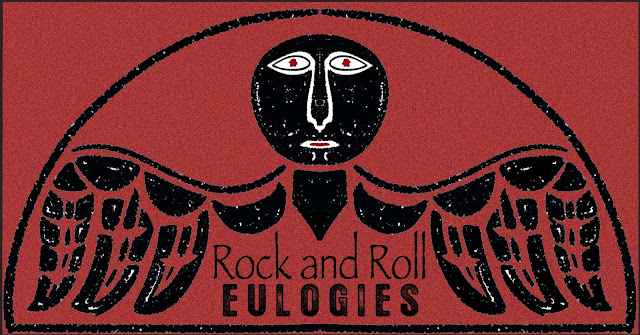David Bowie
David Bowie didn’t mean as much to me as he meant to you. Which is to say that he didn’t mean as much to you as he did to me. Or, alternatively, that he didn't mean as much to me as he did to me; you to you. I can make such preposterous claims on Bowie’s behalf because, like Whitman, he contained multitudes. Or, unlike Whitman, multitudes contained him, shrinkwrapping his features, his songs, his ensemble.
The distinction here is that of interior and exterior. And
the question always hovering around Bowie, like an aura, like a swarm of flies,
is whether the exterior has depth. He is and was the most contemporary
phenomenon: both Modern (Levi-Strauss’s bricoleur)
and Postmodern (Barthes’ tissue of citations). Magpie-Modern Bowie collected
guitar players like shiny baubles: Mick Ronson, Earl Slick, Robert Fripp,
Adrian Belew, Stevie Ray Vaughan, Reeves Gabrels. He assembled bits from other
nests, disparate as Anthony Newley’s and Iggy Pop’s, Bertolt Brecht’s and Neu!’s
His interweavings suggest deeper truths about his sources and about ourselves:
difference ain’t always so different. Whether scrabbled desperately together as
a bulwark against the calamity of being mortal, or prettied and polished to
escalate the eye and ear beyond the infirmities and terrors of terra firma, our
puttings-together and our puttings-out-there all amount to the same thing: talismans,
charms, totems insinuating the elsewhere, the elsewhen.
Referential-Postmodern Bowie tilted into his sources,
allowing them to distort him. He courted disorientation, trusting that true
north would become apparent. Of course, he also knew as well as any of us that,
depending on which way one is facing, true north may be in front, behind, or to
the side. Bowie learned the lessons of collage and montage, both avant-garde
and mass-mediated. He strolled the arcades, bringing back both trinkets and
insights. He prefigured the aesthetics of appropriation: appropriating and
being appropriated in turn; a conduit of the cultural unconscious. He
understood that tipping his hat to his sources was preferable to keeping them
under it. He proved his prescience by stealing from Warhol, Lou, Bolan, and
Iggy, before anyone else knew they had anything worth stealing. But just as
important as the tunes and the poses were the citations. He wanted us to know
his sources. Thus listening forces us to occupy two sites simultaneously. We
listen to Iggy via Bowie or vice versa, clairauditeurs.
Of course time is complicated too. Now when we go back and listen to his
sources, they are Bowified. And all the selves of the world are another.
The creeping sense:
When listening to Low,
that Bowie is not there;
When watching him perform Boys Keep Swinging on Saturday Night Live, that the green-screen puppet is no less (but no more) Bowie than the head that ventriloquizes (or is ventriloquized by) the words;
When watching him perform Boys Keep Swinging on Saturday Night Live, that the green-screen puppet is no less (but no more) Bowie than the head that ventriloquizes (or is ventriloquized by) the words;
When dancing to the Thin White Duke, feeling forced to
reconsider what “soul” must mean in this context…
Once I sang a song of his. Engaging with the words, the
phrasing, the melody, the arrangement – in short, with the material and form of
his art – I came to realize that his songs sometimes contain a powerful
undertow. While the song appears to move effortlessly forward toward inevitable
pop denouement, a friction is generated that threatens to grind the song to a
stop. The words do not sit comfortably in the changes, they buckle
architectonically. Disruptions spike from the groundwork. Singing the song, remaking
it, put me in touch with its subversions. The song, “Joe The Lion,” is
reputedly about the artist, Chris Burden, who disrupted with the best of them. When
Bowie sings offhandedly about a secondhand gun, he’s thinking of Burden having
himself shot as a work of art. When Bowie sings “Nail me to my car / And I’ll
tell you who you are,” he’s thinking of Burden’s “Transfixed,” in which he was
affixed to the back of a Volkswagen, nails driven through his palms.
I don’t know if such an act, much less a pop song, can tell
us who we are. I don’t know if Bowie’s songs can tell us who he is (and now
was). So, I’m left troubled by the contradiction of profundity for sale. Sure
it happens elsewhere: in films and in books and in plenty of music. But Bowie
courted the sales more openly and more successfully than anyone else I listen
to regularly (and anyone else I’ve eulogized here). I can condemn my
aspirations or condone my capitulations. We all have a little Adorno in us. We
want to believe that some things are just plain better than others. We want to
know where the line is drawn between the pleasure of shallow distractions and
the satisfaction of deep engagements. What Bowie offers are contradictions. The
pop and the fashion and the sales figures and the awards and the magazine
profiles and the museum show and, today, the obituaries and tributes. Bowie is
the man who sold the world. But there is a meaning to Bowie that is not simply
this. The dust of our deepest unnervings clings to his threadbare identities,
fashioned from equal parts glitz and chintz. What we sense when we witness
Bowie morph is that what we want most in this life – glory, gold, or goodness –
is just as subject to transformation as the once-upon-a-time David Jones. Our
gilding yields but lilies.
